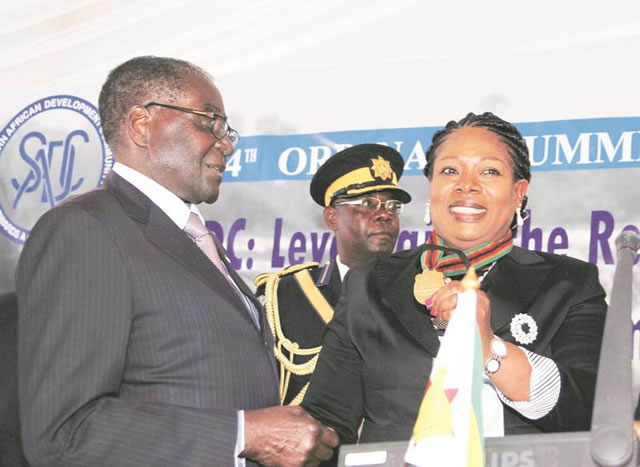President takes reins of Sadc


President Mugabe confers on Sheila Mbita, on behalf of her father Retired Brigadier-General Hashim Mbita, the Munhumutapa Order of Merit in Victoria Falls yesterday. — (Picture by Tawanda Mudimu)
Morris Mkwate in Victoria Falls
PRESIDENT Mugabe yesterday took over the Sadc chairmanship and will over the next year lead Southern Africa in its quest to achieve economic and social transformation.
He took over the reins from Professor Peter Mutharika of Malawi as Zimbabwe transitioned from being on the Sadc agenda for six years to leading the regional group for the next three years.
Zimbabwe was on the agenda of Sadc since March 31, 2007 when the bloc met at an extraordinary Summit in Dar es Salaam, Tanzania, where former South African president Cde Thabo Mbeki was tasked to mediate inter-party dialogue between Zanu-PF and the MDC formations culminating in the inclusive Government and subsequent harmonised elections on July 31 last year.
As deputy chair of the bloc, Zimbabwe was a member of the Summit Troika from August 2013 to August this year; as chairperson, Zimbabwe leads the Summit Troika till August next year; and as immediate-past chair will be a member of the Organ Troika till August 2016.
The President received the Sadc Chair’s badge from President Peter Mutharika of Malawi at the opening of the bloc’s 34th Ordinary Summit of Heads of State and Government to mark the start of his tenure.
Thirteen leaders from the 15-member grouping witnessed the colourful ceremony, which brought together over 700 delegates among them Cabinet ministers, African Union Commission Chair Dr Nkosazana Dlamini Zuma, Sadc Executive Secretary Dr Stergomena Lawrence Tax, legislators, service chiefs and diplomats accredited to Zimbabwe.
President Michael Sata of Zambia and his Angolan counterpart Jose Eduardo dos Santos were represented by their deputies.
In 2007, SADC mandated South Africa, through then President Thabo Mbeki, to mediate talks between Zanu-PF and two MDC formations in a bid to ensure political stability in the country.
The talks — later steered by Mr Mbeki’s successors, Kgalema Motlante and Jacob Zuma — culminated in the formation of the inclusive Government in 2009.
The regional group consistently reviewed the political situation in Zimbabwe and Harare only ceased to be a Sadc agenda item following the July 31, 2013 harmonised elections resoundingly won by President Mugabe and Zanu-PF.
It was after that victory that President Mugabe became Sadc Deputy Chair at the Summit in Malawi last year, paving the way for his elevation to the Chairmanship here yesterday.
The President will lead the region for a year under the theme “Sadc Strategy for Economic Transformation — Leveraging the Region’s Diverse Resources for Sustainable Economic and Social Development through Beneficiation and Value Addition”.
Accepting the post, President Mugabe said: “I feel humbled, and yet greatly honoured, at being appointed the Chairman of Sadc. Being Sadc Chair is an honour to me personally, and to the Government and people of Zimbabwe…
“As Zimbabwe, we look forward to making our contribution to the Sadc agenda, and are confident that we can ensure that the region focuses on interventions that have the greatest impact on the wellbeing of our citizens.”
The President thanked Sadc for supporting Zimbabwe through difficult times, including those brought on by illegal Western sanctions.
SADC first condemned the sanctions in 2007 and has maintained its position on the matter to date.
President Mugabe also expressed gratitude to Frontline leaders who helped liberate Africa from colonialism, and advocated greater recognition for Tanzania’s Founding President Mwalimu Julius Nyerere, who hosted liberation movements in his country.
He criticised Westerners for wanting to oversee elections in Africa, saying only states on the continent and “our friends” should be allowed to supervise polls.
“We thank SADC for consistently calling for the removal of EU and Western illegal sanctions on Zimbabwe, illegal because they were not sanctioned by the UN whose effects are debilitating to our economy and to our people.
“We don’t understand why they have ever been imposed. To tell you the truth, we don’t. Neither does SADC understand. Without your support, we would not be standing on our feet today. We will remain eternally grateful for that. I say, once again, thank you SADC.
“We shall forever be grateful to Southern African countries for the sacrifices they made for Zimbabwe to be free.”
The President said Sadc should beneficiate its natural resources to ensure economic and social development, while advocating fewer and focused programmes with high implementation rates, and domestic regional funding strategies.
Regarding Israel’s continued bombardment of Gaza, the SADC Chair said the West – which claims high moral ground on human rights – was indifferent to the murder of innocent women and children and attacks on United Nations installations.










Comments